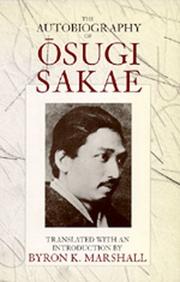| Listing 1 - 2 of 2 |
Sort by
|
Book
ISBN: 1487527594 Year: 2021 Publisher: Toronto : University of Toronto Press,
Abstract | Keywords | Export | Availability | Bookmark
 Loading...
Loading...Choose an application
- Reference Manager
- EndNote
- RefWorks (Direct export to RefWorks)
After the Anschluss (annexation) in 1938, the Nazis forced Austrian Chancellor Kurt Schuschnigg to resign and kept him imprisoned for seven years, until his rescue by the Allies in 1945. Schuschnigg’s privileged position within the concentration camp system allowed him to keep a diary and to write letters which were smuggled out to family members. Drawing on these records, Prison Elite paints a picture of a little-known aspect of concentration camp history: the life of a VIP prisoner. Schuschnigg, who was a devout Catholic, presents his memoirs as a "confession," expecting absolution for any political missteps and, more specifically, for his dictatorial regime in the 1930s. As Erika Rummel reveals in fascinating detail, his autobiographical writings are frequently unreliable. Prison Elite describes the strategies Schuschnigg used to survive his captivity emotionally and intellectually. Religion, memory of better days, friendship, books and music, and maintaining a sense of humour allowed him to cope. A comparison with the memoirs of fellow captives reveals these tactics to be universal. Studying Schuschnigg’s writing in the context of contemporary prison memoirs, Prison Elite provides unique insight into the life of a VIP prisoner.
Statesmen --- World War, 1939-1945 --- Correspondence. --- Diaries. --- Concentration camps. --- Prisoners and prisons, German --- Anschluss. --- Austria. --- Austrian chancellor. --- Germany. --- Holocaust. --- Kurt Schuschnigg. --- Nazi prison. --- Sachsenhausen. --- VIP prisoner. --- WWII. --- World War Two. --- concentration camps. --- coping strategies. --- elite prisoner. --- prison memoirs.

ISBN: 0520912381 0585101434 0520077598 0520077601 9780520912380 9780585101439 9780520077591 9780520077607 Year: 1992 Volume: 6 Publisher: Berkeley, California : University of California Press, Ltd.,
Abstract | Keywords | Export | Availability | Bookmark
 Loading...
Loading...Choose an application
- Reference Manager
- EndNote
- RefWorks (Direct export to RefWorks)
In the Japanese labor movement of the early twentieth century, no one captured the public imagination as vividly as Osugi Sakae (1885-1923): rebel, anarchist, and martyr. Flamboyant in life, dramatic in death, Osugi came to be seen as a romantic hero fighting the oppressiveness of family and society. Osugi helped to create this public persona when he published his autobiography (Jijoden) in 1921-22. Now available in English for the first time, this work offers a rare glimpse into a Japanese boy's life at the time of the Sino-Japanese (1894-95) and the Russo-Japanese (1904-5) wars. It reveals the innocent--and not-so-innocent--escapades of children in a provincial garrison town and the brutalizing effects of discipline in military preparatory schools. Subsequent chapters follow Osugi to Tokyo, where he discovers the excitement of radical thought and politics. Byron Marshall rounds out this picture of the early Osugi with a translation of his Prison Memoirs (Gokuchuki), originally published in 1919. This essay, one of the world's great pieces of prison writing, describes in precise detail the daily lives of Japanese prisoners, especially those incarcerated for political crimes.
Anarchists --- Political Science --- Law, Politics & Government --- Socialism, Communism & Anarchism --- Ōsugi, Sakae, --- Ohsugi, Sakae, --- Sakae, Ōsugi, --- 大杉栄, --- 大杉榮, --- Ōsugi, Sakae, --- 20th century japanese history. --- 20th century japanese political movements. --- amakasu incident. --- anarchism. --- anarchist periodicals. --- anarchist. --- autobiography. --- discipline. --- esperanto school. --- garrison town. --- japan. --- japanese labor movement. --- japanese prisoners. --- japanese. --- labor. --- martyr. --- military school. --- oppression. --- osugi sakae. --- political crimes. --- preparatory school. --- prison memoirs. --- prison writing. --- public persona. --- radical politics. --- radical thought. --- radical. --- rebel. --- russo japanese war. --- sino japanese war. --- tokyo. --- Anarchism. --- Osugi, Sakae, --- Osugi, Sakae. --- Japan.
| Listing 1 - 2 of 2 |
Sort by
|

 Search
Search Feedback
Feedback About
About Help
Help News
News